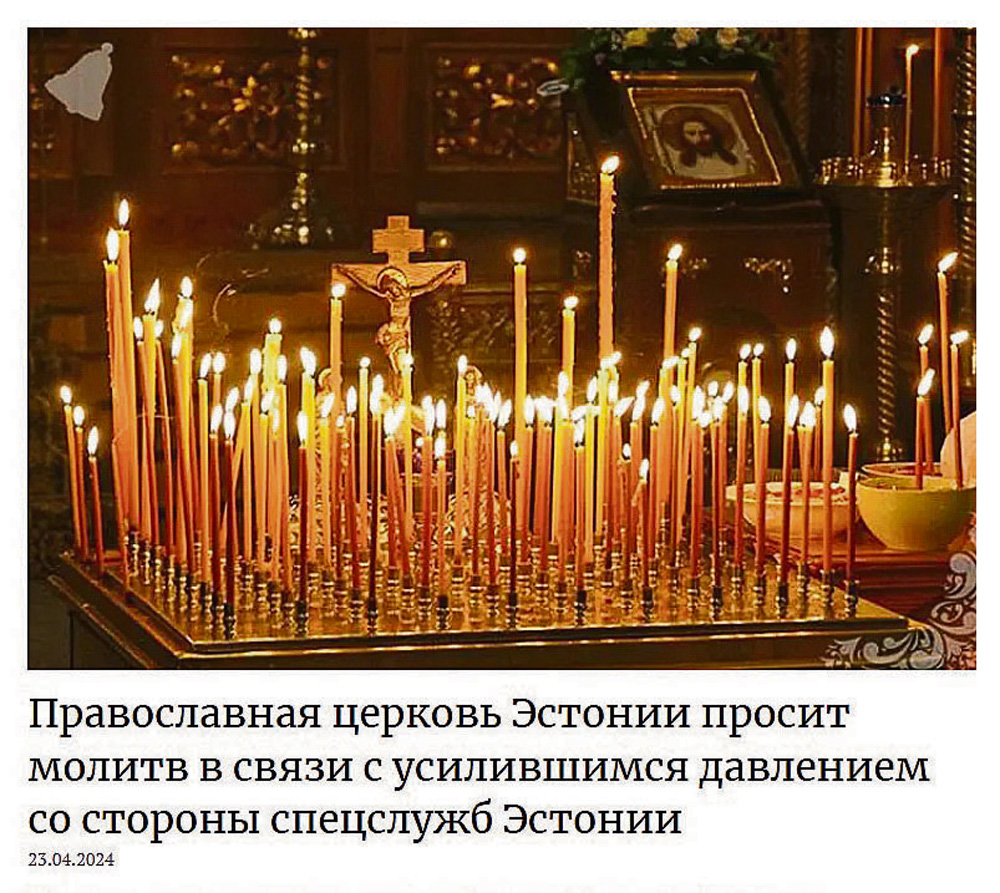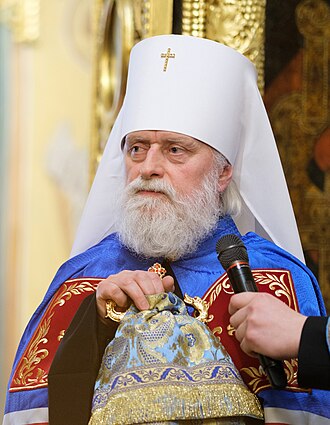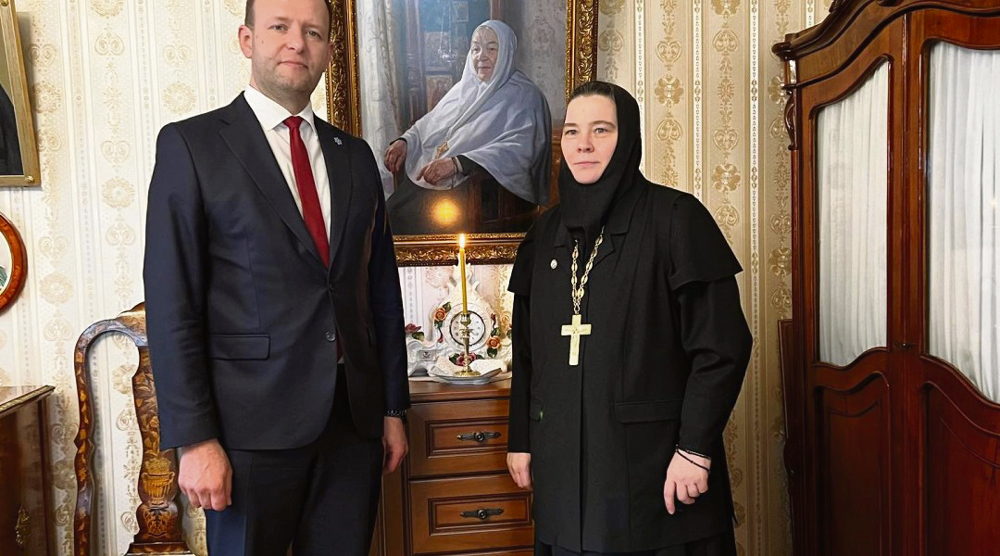Ilze Kuzmina, ‘Latvijas Avīze’
“Russophobia”, “Political repression”, “Captivity”, “Utter permissiveness” – these were the keywords used by antifashistcom.livejournal.com in an article published at the end of April about the Estonian Minister of Interior Affairs and other authorities’ efforts to get the Estonian Orthodox Church, which is still under the Patriarchate of Moscow, to renounce its ties with the city. Other pro-Kremlin websites, such as baltija.eu, have also written about the events in Estonia, claiming that the Estonian Orthodox Church “through unofficial channels” is calling for prayers in the hope of protection against the pressure from the special services. It is known to Latvijas Avīze that there is also concern among the Latvian Orthodox.
Ties not severed with Moscow
Estonia has two Orthodox churches: one of them is under Moscow’s authority, and relations with it soured after the expulsion of its Metropolitan, Yevgeny, a Russian citizen. The Moscow Patriarchate is mainly made up of those who immigrated to Estonia during the Soviet years, and has a relatively large number of parishes – 35. The other is the Estonian Apostolic Orthodox Church, which identifies more with Greek Orthodoxy, and has been granted autonomy by Bartholomew I of Constantinople. This branch of the church has a longer history in Estonia, but encompasses fewer parishes.
The Russian Orthodox Church, led by Patriarch Kirill of Moscow, declared in March that the war launched by Russia is holy, and is not only against Ukraine, but the entire Western world. Russia’s influence is supposed to extend beyond the borders of the former Russian Empire.
Sebastian Rimestad, a religious scholar at the University of Leipzig, wrote on talkabout.iclrs.org at the end of March: “The rhetoric of the Russian Orthodox Church on the ongoing war in Ukraine is not only a difficult issue for the Orthodox bishops and the faithful in Ukraine, but also creates a particularly tricky dilemma for the Orthodox Churches in the Baltic States. In Estonia, Latvia and Lithuania, the Orthodox Church is primarily the religious home of the post-Soviet Russian minority, although in all three countries there are also visible and influential Orthodox representatives who do not identify themselves as Russian.” He goes on to say that in all three Baltic states the Orthodox Churches were expected to distance themselves from Moscow, but that this did not happen to the same extent in all of them. All over the world, Orthodoxy is splitting into ‘Greek’ and ‘Russian’ factions, but this is especially pronounced in the Baltics.
Ņikita Andrejevs, research assistant at the Faculty of Theology at the University of Latvia, also tells Latvijas Avīze:
“Kirill’s war propaganda has undermined the attitude towards Orthodox Christians belonging to the Moscow Patriarchate outside the borders of Russia and its allies, as well as establishing tensions between the Moscow Patriarchate and the churches that publicly distance themselves from the Patriarch’s views or subordination to him. Globally, the Patriarchate of Constantinople enjoys the greatest support as an alternative to Moscow, as it could be chosen by those who do not accept Moscow’s position.”
Church as a terrorist organisation
Attacks against Estonia on pro-Kremlin websites under the guise of religious freedom emerged at a time when the Estonian Parliament was preparing to declare the Moscow Patriarchate a terrorist organisation. The declaration was made this Monday. In a statement, the neighbouring MPs say they support freedom of religion, but in today’s climate “the state must protect citizens against terrorist and other forms of hate propaganda”. In the Parliament’s view, the Moscow Patriarchate now poses a threat to Estonia. At the same time, it was added that the Parliament is targeting the Moscow Patriarchate, not the Orthodox Church as a whole.
However, the important question is what the consequences of this parliamentary decision will be for the Orthodox in Estonia. When asked about the future of the churches under Moscow, Ringo Ringvee, an adviser to the Religious Affairs Department of the Estonian Ministry of Interior Affairs, did not give a definitive answer to Latvijas Avīze, but said that they would have to decide their own future. On its website, the Estonian Ministry of Interior Affairs stresses that each Orthodox parish is legally independent, suggesting that it has the right to split from the Moscow Patriarchate.
Research assistant at the Faculty of Theology of the University of Latvia Ņ. Andrejevs predicts that, in one way or another, the Estonian Orthodox Church, which belongs to the Moscow Patriarchate, will be forced to sever relations with the Patriarchate.
“It is clear that the Estonian government is demonstrating an open dialogue with the Church, in which the Estonian Lutheran Bishop is also involved, and in which the Orthodox voice is likewise heard, in contrast to the customary silence of the Orthodox in Latvia. It is likely that the dioceses and parishes of the Church, as well as the Tallinn Nevsky Alexander Cathedral, will change their statutes and in this way demonstrate their loyalty, their desire to continue their work and their disagreement with Patriarch Kirill of Moscow’s justification of Russian aggression,” says N. Andreev.
Fear of a monastery closing its doors
Estonia is also home to a major Orthodox shrine, the Pühtitsa Convent, which remains under the direct authority of Patriarch Kirill of Moscow. According to Ņ. Andrejevs, monasteries have a special significance in Orthodoxy. They are centres of spiritual life that appeal to the faithful outside the monasteries, but also to the public, as they can be important cultural monuments and serve as sites of pilgrimage and tourism alike. The Pühtitsa Convent is visited by people from Estonia as well as neighbouring countries, which demonstrates its symbolic influence beyond the country’s borders. Founded in 1891, it is an important monument of the roots of Estonian Orthodoxy. It houses several icons of Orthodox significance.

“The Estonian Orthodox Church calls for prayers in the face of increased pressure from Estonian special services,” the website baltija.eu wrote in April. SCREENSHOT FROM BALTIJA.EU
At the end of April, the Estonian Minister of Interior Affairs Lauri Läänemets travelled there to discuss the future of the monastery with its head, following the recognition of the Moscow Patriarchate as a terrorist organisation. An anti-fascist website interprets this as the minister demanding a “severing of ties” with Moscow, threatening to close the monastery. Both the Russian Embassy in Estonia and representatives of the Moscow Patriarchate have already accused the Estonian authorities of undermining religious freedom and constitutional rights.
Meanwhile, in a statement published on its website, the Estonian Ministry of Interior Affairs states that the country’s goal is to ensure the Estonian Orthodox Church no longer has legal or canonical ties with the Moscow Patriarchate, but there is no talk of closing the monastery. The Minister said that there is no problem to legally separate the monastery from Moscow in secular terms, but it is more complicated because of church law. He described the meeting at the monastery itself as warm and open.
The monastery also announced the meeting on its website. The possible closure is never mentioned, it is more concerned with the legal and historical ties that bind the monastery to the Moscow Patriarchate, and it is stressed that the monastery has never compromised itself politically. However, the news suggests that the monastery itself believes the right solution would be for the Estonian government to propose that Patriarch Kirill of Moscow relinquish his authority over it. That being said, Kirill is unlikely to do so. As time has shown, Russia is not in the habit of giving up its influence.

Yevgenii, Metropolitan of the Estonian Orthodox Church, Valery Reshetnikov, a Russian citizen in the secular world. Photo: Wikipedia.org
Ņ. Andrejevs estimates that the Pühtitsa Convent’s withdrawal from Moscow could take longer than that of the Orthodox churches. He agrees with the monastery’s representatives that only the Patriarch of Moscow could canonically relinquish it: “It is possible that the monastery will find a way to deal with this issue legally or canonically, but it is also possible that the Pühtitsa Convent could remain an island of the Moscow Patriarchate in Estonia.” He believes that the monastery’s relationship with the state may be strained for some time, but that this is unlikely to have a significant impact on its day-to-day operations.
Asked whether Estonia’s political decisions infringe on freedom of religion, Ņ. Andrejevs replied:
“If the state sees a threat to public security in the activities of a religious organisation, it may interfere in accordance with lawful procedure. However, it must avoid generalisations and discrimination that would restrict the rights of members of a religious organisation or exclude them from society, maintaining dialogue with religious organisations and ensuring that members can integrate into the community.”

The Estonian Minister of Interior Affairs Lauri Läänemets visits Pühtitsa Convent and meets its head, Igumen Filaret. Photo by Estonian Ministry of Interior Affairs.

